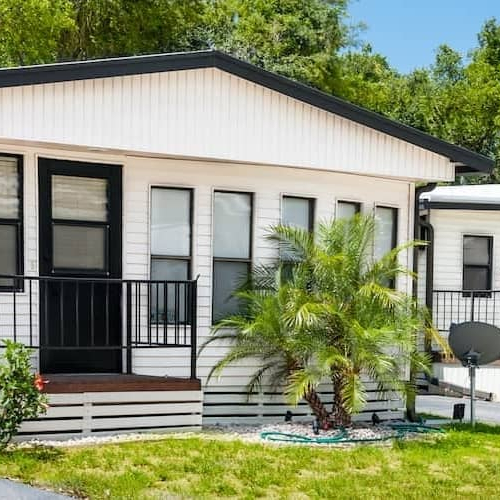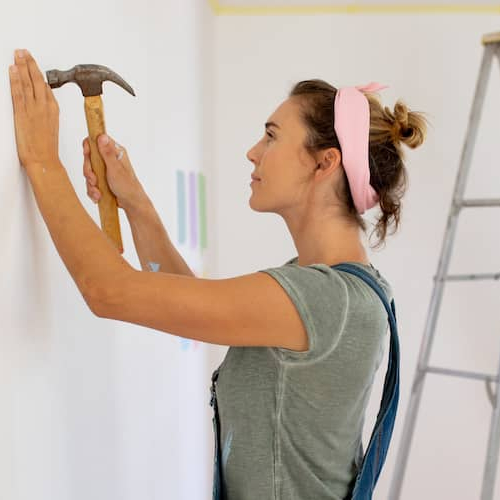Manufactured homes: Defined and explained
Jul 21, 2025
•9-minute read

Homes come in all shapes and sizes. A home can be built of wood, brick, and cement – a “stick-built home – but it also can be a manufactured home built piece by piece in a factory and transported to the location of your choosing. A manufactured home can be an affordable way to get into homeownership. But what features define a manufactured home, how much do they cost, and how do you buy one? Read on to find out.
What is a manufactured home?
A manufactured home is built in a factory according to U.S. Department of Housing and Urban Development standards. Manufactured homes are built in sections, then moved to a specific site and installed on a foundation that may be either temporary or permanent.
Modern manufactured homes come in three models:
- Single-wide. A home built in one long section.
- Double-wide. Popular with first-time home buyers, this model features two sections joined together to make a larger home.
- Triple-wide. The least common of the three manufactured home models, a triple-wide has three sections joined together.
Manufactured housing vs. other prefab homes
Manufactured homes are similar to prefabricated, or “prefab,” homes, but there are some differences.
Mobile homes and trailer homes
Mobile home refers to any manufactured home made before June 15, 1976. Today’s manufactured homes feature more solid structures and better amenities than their predecessors. A trailer home is a prefab home that is permanently mounted to a chassis and moved to its final location.
These terms are no longer used because they refer to older, lower-quality homes that fail to meet modern standards. The construction of manufactured homes is regulated by the National Manufactured Housing Construction and Safety Standards Act, which was passed in 1974 and updated in 2000.
The law was enacted to “protect the quality, durability, safety, and affordability of manufactured homes; and to facilitate the availability of affordable manufactured homes and to increase homeownership for all Americans.”
Modular homes
Modular homes are prefabricated houses placed on a permanent foundation.
Modular homes and manufactured homes share other similarities:
- Both are built in factories
- Both are transported to their location
- Both are relatively affordable due to efficient construction methods and bulk material availability
Modular homes are particularly popular in Southern locations, where land is more available and affordable. Cities with numerous listings for manufactured homes include Houston, Knoxville, Charleston, and Charlotte. They are also popular in cities like Los Angeles, which are crowded and are being transformed after recent wildfires.
Unlike manufactured homes, modular homes:
- Are delivered in sections and built on-site, almost always on a permanent foundation
- Feature entirely customizable floor plans
- Are automatically considered real property once completed
Kit homes
Kit homes are manufactured homes shipped to a location in an unassembled state and assembled on site by the homeowner or a contractor. You can order a kit home in sizes ranging from a tiny work studio to a three-bedroom contemporary home.
In contrast, a manufactured home typically arrives completed.
While you can assemble kit homes on your own, building a house is no small task, even if you have a solid team of handy, enthusiastic friends. If you don’t have a lot of experience with this type of work, you might want to hire contractors. Keep in mind that you’ll also need to set up plumbing and other utilities, which may require contractors to ensure your property meets local codes.
How much do manufactured homes cost?
As previously mentioned, manufactured homes are an affordable option. The average home sales price for a new manufactured home was $122,900, according to the 2024 Census.
Manufactured homes are often significantly cheaper than building a traditional house because:
- Manufacturers can buy building materials in bulk at a lower cost.
- Indoor construction helps control costs and ensures an efficient construction schedule.
- Construction isn’t hindered by weather.
As with more traditional housing, several factors contribute to the total cost of a manufactured home. In addition to the unit price, the items below influence the overall cost of the house.
Square footage
The price of a manufactured home varies depending on its size and features. You can verify a manufactured home’s costs by obtaining detailed price breakdowns that clearly separate the home price from land costs, site preparation, and installation fees. Most reputable dealers provide pricing sheets that show the cost per square foot and any upgrade fees, making it easy to compare models.
The average cost per square foot of a manufactured home ranges from $40 – $85. The cost for most stick-built homes can more than double that figure.
Land
One of the key elements of a manufactured home is the land on which it will sit. You can either lease a spot in a manufactured home community or buy a plot of land. The price of land varies based on location, but rural land is typically more affordable than urban or suburban plots.
Financing options exist that can help you to purchase land, including:
- Land loan: A land loan is specifically designed for purchasing undeveloped land. Land loans typically require a larger down payment and have higher interest rates than traditional mortgages, since the land itself serves as collateral.
- USDA loan: This loan offers government-backed financing for eligible rural and suburban areas, often providing favorable terms, including no down payment options for qualified buyers.
Leasing may be a good option for some, as it allows you to situate your home on someone else’s property through a monthly rental agreement. This can significantly reduce your up-front costs.
Foundation
A permanent foundation is recommended for several reasons: It provides stability and structural support, offers greater protection against environmental factors, and makes a manufactured home eligible for traditional financing. Having a foundation makes a modular home real property, which lenders tend to view more favorably when it comes to financing.
Property taxes
One of the minuses of owning real property is that it requires you to pay property taxes. Which type and how much tax you pay will depend on how the home is classified and whether you own the underlying land. Many states regard manufactured homes as real property and charge property taxes if a manufactured home is permanently affixed to the land. Conversely, taxes on homes in a manufactured home community are typically paid by the landowner.
Delivery and installation
Delivery and assembly fees vary significantly. Some manufacturers include delivery within a certain radius of their factory, typically 50 to 100 miles, but charge additional fees for distances beyond this range. Assembly costs also depend on the complexity of your home’s setup and local regulations.
To verify your costs upfront, request a detailed quote for delivery, setup, and any additional fees. Ask specifically about distance-based charges, site preparation requirements, and whether services like utility connections are included. Obtaining this information in writing can help you budget accurately and avoid surprises at the time of delivery.
Utilities
As with any type of home, configuring utilities such as water, plumbing, electricity, internet, and cable adds to the overall cost of a manufactured home. The costs can vary significantly depending on whether the home site already has utility connections or if new lines need to be run to the property. Many manufacturers include a home warranty that covers issues with certain utilities and appliances, providing peace of mind during the first year of ownership.
Pros and cons of a manufactured house
There are plenty of benefits that come with owning a manufactured home, but there are downsides, as well.
Advantages of manufactured housing
The pluses of owning a manufactured home include:
- Affordability. Manufactured homes typically cost less than traditional homes, sometimes as much as 30% less for comparable square footage.
- Financing options. Buyers can choose from several financing options, including traditional mortgages for homes permanently affixed to owned land or chattel loans for homes in rental communities. Many lenders now offer specialized manufactured home loans, and some government programs, such as Federal Housing Administration and Veterans Affairs loans, are available to qualified buyers.
- Customization. Modern manufactured homes allow you to customize the floor plan, room layouts, finishes, fixtures, and appliances. Many manufacturers also offer structural modifications, such as extra bedrooms, expanded living rooms, or special features like walk-in closets or spa-style bathrooms.
- Energy efficiency. Today’s manufactured homes are built to strict HUD energy standards and often exceed traditional home efficiency requirements through improved insulation, energy-efficient windows, and modern heating and cooling systems. The controlled factory environment also allows for better sealing and insulation installation compared to outdoor construction, resulting in homes that can maintain consistent temperatures throughout the year.
Disadvantages of manufactured housing
A manufactured home isn’t the perfect option for everyone, however. It can come with several disadvantages, including:
- Slower appreciation. Manufactured homes tend to appreciate more slowly than traditional homes, especially if you don’t own the land.
- Financing limitations. Finding financing for a manufactured home can be more challenging than getting a traditional mortgage, because many conventional lenders don’t offer loans for manufactured homes. This smaller pool of lenders can mean higher interest rates and less favorable loan terms.
- Zoning restrictions. Many communities have strict zoning laws that limit the placement of manufactured homes. At the same time, other areas require manufactured homes to meet specific architectural standards or be placed only in designated communities.
- Stigma and resale challenges. Despite quality improvements, owners of manufactured homes still can face a stigma that affects their property’s resale value and marketability. Some buyers automatically dismiss manufactured homes, creating a smaller pool of potential buyers when you’re looking to sell.
How to buy a manufactured home
Because a manufactured home is not a standard standalone property, buying one can be a little more complicated. Once you’ve bought a manufactured home, here are the critical steps to making it your perfect place to live:
- Choose a location. Maybe you want to escape the city and live in a secluded, natural spot. Or perhaps you want to live in a suburban area with amenities such as shops, restaurants, and entertainment. Location will affect price – the more desirable the location, the more expensive it will be.
- Find a manufactured home seller. You can visit local dealerships, browse online retailers (even Amazon sells them these days), or look for used manufactured homes. Take time to compare floor plans, features, and energy efficiency ratings to find the best fit for your needs and budget.
- Obtain financing. There are several financing options for manufactured homes, including conventional loans, if your home is attached to a permanent foundation. Other options include FHA loans, Title I loans, VA loans, and chattel loans.
- Get the land ready. You’ll need to prepare the property before your home arrives, which includes clearing and leveling the land, installing utility connections, and preparing the foundation. Don’t forget to obtain the necessary permits from your local building department.
Financing a manufactured home
Once you have found a place to put your new home, you should search for a suitable loan option. They include:
- Government-backed mortgages. HUD-approved loans, including FHA and VA loans, are available to qualified individuals. In the case of VA loans, only buyers who’ve served in the military and their surviving spouses are eligible.
- Conventional loans. Freddie Mac and Fannie Mae both guarantee conventional mortgages specifically designed for manufactured homes, provided these homes are permanently affixed to the property on which they sit.
- Chattel loans. These are secured loans that put up your movable property, or “chattel,” as collateral. A loan repayment term for a chattel loan is typically 10 – 20 years.
- Dealer financing. In some cases, the dealership where you buy your manufactured home will finance your purchase. While dealer financing tends to be more expensive than a traditional mortgage, it could be a good option if you’re struggling to get a loan.
Rocket Mortgage offers financing on manufactured homes that were built on or after June 15, 1976, are permanently affixed to the land, and approved by HUD.
FAQ
Here are answers to common questions about manufactured homes.
Is it cheaper to build a house or a manufactured home?
Manufactured homes are generally less expensive to build than stick-built homes due to their efficient factory construction process, bulk material availability, and faster build times. Both types must meet safety standards; however, manufactured homes follow federal HUD codes, while stick-built homes follow local building codes.
How long do manufactured homes last?
With proper maintenance, manufactured homes can last 50 years or more. The lifespan depends on factors like building quality, proper foundation installation, regular maintenance, and environmental conditions. It is worth noting that homes built after the implementation of the HUD standards in 1976 are generally more durable than earlier models.
What is considered a permanent foundation for a manufactured home?
A permanent foundation for a manufactured home must be constructed of durable materials, such as concrete, mortar, or treated wood, and have attachment points that anchor and stabilize the house to the underlying soil or rock. Like many other elements of a manufactured home, these rules require certification by a professional engineer to meet HUD standards.
The bottom line: Understanding manufactured homes
A manufactured home can be an affordable option for first-time home buyers. Manufactured homes cost less and can be built more quickly than stick-built houses. Today’s manufactured homes also allow you to customize everything from the floor plan to the finishes, all with energy-efficient modern construction.
Begin the home loan approval process today with Rocket Mortgage.

Joel Reese
Joel Reese is a freelance writer who has written about real estate, higher education, sports, and myriad other subjects. He has been published in The Best American Sports Writing series, Details, Spin, Texas Monthly, Huffington Post, Chicago magazine, and many other outlets. His website, ReeseWrites.net, features several samples of his work.
Related resources
6-minute read
What is a single-family home and is it right for you?
Single-family homes are the most common housing option in the United States. Learn what a single-family home is and whether it’s the right fit for you....
Read more

6-minute read
How much does a tiny home cost?
The tiny house movement is growing in popularity, but how much does a tiny home cost? Learn about the factors that impact pricing in this complete guide.
Read more

7-minute read
Cheapest ways to build a house: 12 tips for affordable home building
Building a home can be a viable option for buyers in a competitive market, but expenses can add up quickly. Discover the cheapest ways to build a house.
Read more